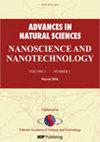微波合成的用于储能的 Fe2O3/C 纳米材料
IF 2.1
Q3 MATERIALS SCIENCE, MULTIDISCIPLINARY
Advances in Natural Sciences: Nanoscience and Nanotechnology
Pub Date : 2023-11-30
DOI:10.1088/2043-6262/ad089f
引用次数: 0
摘要
本研究以 Fe(NO3)3.6H2O 为铁源,通过微波和煅烧合成了 Fe2O3 和 Fe2O3/C 纳米材料。合成材料的物理特性分别通过 X 射线衍射 (XRD) 和扫描电子显微镜 (SEM) 以及 X 射线能量色散光谱 (EDS) 进行了评估。以 Fe2O3/C 纳米材料为基础制备了 Fe2O3/C 复合电极,并将其用作铁基充电电池的负极。通过循环伏安法和电静态充放电测量研究了 Fe2O3/C 复合电极的电化学性能。结果表明,合成条件会影响 Fe2O3/C 电极的氧化还原反应。此外,还研究了添加剂对 Fe2O3/C 电极电化学特性的影响。电极和电解液中的添加剂改善了 Fe2O3/C 电极的循环性和放电容量。本文章由计算机程序翻译,如有差异,请以英文原文为准。
Fe2O3/C nanomaterials synthesized by microwave for energy storage applications
In this study, Fe(NO3)3.6H2O was used as the iron source for synthesising Fe2O3 and Fe2O3/C nanomaterials by microwave together with calcination. Physical characterisations of the synthesised materials have been evaluated by x-ray diffraction (XRD) and scanning electron microscopy (SEM) together with x-ray energy-dispersive spectroscopy (EDS), respectively. The Fe2O3/C composite electrodes were prepared based on Fe2O3/C nanomaterials and used as the negative electrode in the iron-based rechargeable battery. The electrochemical properties of Fe2O3/C composite electrodes were investigated by cyclic voltammetry and galvanostatic charge/discharge measurements. The obtained results show that the synthesised conditions affect the redox reactions of the Fe2O3/C electrodes. The influences of additives on the electrochemical properties of Fe2O3/C electrodes were also examined. The additives in electrode and electrolyte improved the cyclability, discharge capacity of Fe2O3/C electrode.
求助全文
通过发布文献求助,成功后即可免费获取论文全文。
去求助
来源期刊

Advances in Natural Sciences: Nanoscience and Nanotechnology
NANOSCIENCE & NANOTECHNOLOGYMATERIALS SCIE-MATERIALS SCIENCE, MULTIDISCIPLINARY
自引率
4.80%
发文量
0
 求助内容:
求助内容: 应助结果提醒方式:
应助结果提醒方式:


